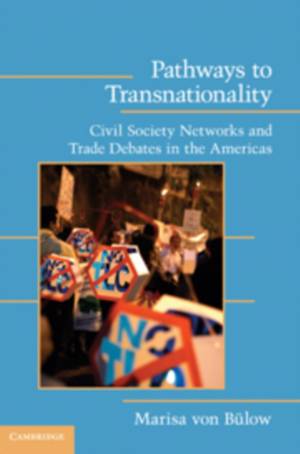
Door een staking bij bpost kan je online bestelling op dit moment iets langer onderweg zijn dan voorzien. Dringend iets nodig? Onze winkels ontvangen jou met open armen!
- Afhalen na 1 uur in een winkel met voorraad
- Gratis thuislevering in België vanaf € 30
- Ruim aanbod met 7 miljoen producten
Door een staking bij bpost kan je online bestelling op dit moment iets langer onderweg zijn dan voorzien. Dringend iets nodig? Onze winkels ontvangen jou met open armen!
- Afhalen na 1 uur in een winkel met voorraad
- Gratis thuislevering in België vanaf € 30
- Ruim aanbod met 7 miljoen producten
Zoeken
Building Transnational Networks
Civil Society and the Politics of Trade in the Americas
Marisa Von Bülow
€ 172,95
+ 345 punten
Uitvoering
Omschrijving
Building Transnational Networks tells the story of how a broad group of civil society organizations came together to contest free trade negotiations in the Americas. Based on research in Brazil, Chile, Mexico, the United States, and Canada, it offers a full hemispheric analysis of the creation of civil society networks as they engaged in the politics of trade. The author demonstrates that most effective transnational actors are the ones with strong domestic roots and that "southern" organizations occupy key nodes in trade networks. The fragility of activist networks stems from changes in the domestic political context as well as from characteristics of the organizations, the networks, or the actions they undertake. These findings advance and suggest new understandings of transnational collective action.
Specificaties
Betrokkenen
- Auteur(s):
- Uitgeverij:
Inhoud
- Aantal bladzijden:
- 280
- Taal:
- Engels
- Reeks:
Eigenschappen
- Productcode (EAN):
- 9780521191562
- Verschijningsdatum:
- 13/09/2010
- Uitvoering:
- Hardcover
- Formaat:
- Genaaid
- Afmetingen:
- 150 mm x 231 mm
- Gewicht:
- 517 g

Alleen bij Standaard Boekhandel
+ 345 punten op je klantenkaart van Standaard Boekhandel
Beoordelingen
We publiceren alleen reviews die voldoen aan de voorwaarden voor reviews. Bekijk onze voorwaarden voor reviews.











